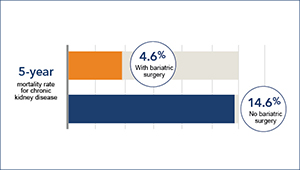Eric A. Johnson, MS
Biography
Eric Johnson, MS, completed the University of Washington’s biostatistics master’s program in 2008. His thesis explored common theoretical problems involved with missing data. He quantified them, highlighting conditions leading to suboptimal performance, and provided new guidelines for using various multiple imputation techniques.
During his time at KPWHRI, Mr. Johnson has been involved with multiple projects involving direct intervention with the care-delivery system, observational studies and microsimulation modeling on colorectal and ovarian cancer, massage therapy, and estimating radiation exposure from medical imaging. His current responsibilities lie in research on obesity, opioids, and mental health.
Before earning his master’s degree, Mr. Johnson worked for four years as a research assistant on the Multi-Ethnic Study of Atherosclerosis (MESA), performing statistical analyses, verifying incoming data, and developing a process for providing data sets to all MESA researchers. Later, he was a research statistician with the Department of Veteran Affairs (VA), serving as the primary analyst in an investigation of how well VA hospitals performed non-cardiac surgeries. Mr. Johnson assessed statistical models used by the National Surgical Quality Improvement Program—then devised, tested, and implemented improved models, reporting his findings to VA leadership.
Research interests and experience
-
Biostatistics
Multiple imputation; prediction models, working with large data
-
Health Systems
Implementing prediction models, and validating that they work as intended. Research into interventions that are financially feasible for health systems to widely implement
-
Cancer
-
Complementary & Integrative Health
-
Health Services & Economics
-
Obesity
-
Mental Health
Recent publications
Mashaw A, Johnson E, Shulman E, Rastogi R, Varner K, Womack J, Crowland K Advanced care at home at scale in an integrated health care system 2023 Dec;29(12):e357-e364. doi: 10.37765/ajmc.2023.89469. Epub 2023-12-01. PubMed
Shortreed SM, Walker RL, Johnson E, Wellman R, Cruz M, Ziebell R, Coley RY, Yaseen ZS, Dharmarajan S, Penfold RB, Ahmedani BK, Rossom RC, Beck A, Boggs JM, Simon GE Complex modeling with detailed temporal predictors does not improve health records-based suicide risk prediction 2023 Mar 23;6(1):47. doi: 10.1038/s41746-023-00772-4. Epub 2023-03-23. PubMed
Courcoulas AP, Johnson E, Arterburn DE, Haneuse S, Herrinton LJ, Fisher DP, Li RA, Theis MK, Liu L, Taylor B, Cooper J, Chin PL, Grinberg GG, Gupta A, Saurabh S, Um SS, Yenumula PR, Zelada JL, Coleman KJ Reduction in Long-term Mortality after Sleeve Gastrectomy and Gastric Bypass Compared to Non-surgical Patients with Severe Obesity 2023 Mar;277(3):442-448. doi: 10.1097/SLA.0000000000005155. Epub 2021-08-13. PubMed
Coleman KJ, Shu YH, Fischer H, Johnson E, Yoon TK, Taylor B, Imam T, DeRose S, Haneuse S, Herrinton LJ, Fisher D, Li RA, Theis MK, Liu L, Courcoulas AP, Smith DH, Arterburn DE, Friedman AN Bariatric Surgery and Risk of Death in Persons with Chronic Kidney Disease 2022 Dec;276(6):e784-e791. doi: 10.1097/SLA.0000000000004851. Epub 2021-03-03. PubMed
Cruz M, Shortreed SM, Richards JE, Coley RY, Yarborough BJ, Walker RL, Johnson E, Ahmedani BK, Rossom R, Coleman KJ, Boggs JM, Beck AL, Simon GE Machine Learning Prediction of Suicide Risk Does Not Identify Patients Without Traditional Risk Factors 2022 Aug 31;83(5). doi: 10.4088/JCP.21m14178. Epub 2022-08-31. PubMed
Fisher DP, Liu L, Arterburn D, Coleman KJ, Courcoulas A, Haneuse S, Johnson E, Li RA, Theis MK, Taylor B, Fischer H, Cooper J, Herrinton LJ Remission and Relapse of Hypertension After Bariatric Surgery: A Retrospective Study on Long-Term Outcomes 2022 Jun;3(2):e158. doi: 10.1097/AS9.0000000000000158. Epub 2022-04-27. PubMed
Penfold RB, Carrell DS, Cronkite DJ, Pabiniak C, Dodd T, Glass AM, Johnson E, Thompson E, Arrighi HM, Stang PE Development of a machine learning model to predict mild cognitive impairment using natural language processing in the absence of screening 2022 May 12;22(1):129. doi: 10.1186/s12911-022-01864-z. Epub 2022-05-12. PubMed
Koffman L, Levis AW, Haneuse S, Johnson E, Bock S, McSperitt D, Gupta A, Arterburn D Evaluation of Intensive Telephonic Nutritional and Lifestyle Counseling to Enhance Outcomes of Bariatric Surgery 2022 Jan;32(1):133-141. doi: 10.1007/s11695-021-05749-4. Epub 2021-10-19. PubMed
Arterburn DE, Johnson E, Coleman KJ, Herrinton LJ, Courcoulas AP, Fisher D, Li RA, Theis MK, Liu L, Fraser JR, Haneuse S Weight Outcomes of Sleeve Gastrectomy and Gastric Bypass Compared to Nonsurgical Treatment 2021 Dec;274(6):e1269-e1276. doi: 10.1097/SLA.0000000000003826. PubMed
Penfold RB, Johnson E, Shortreed SM, Ziebell RA, Lynch FL, Clarke GN, Coleman KJ, Waitzfelder BE, Beck AL, Rossom RC, Ahmedani BK, Simon GE Predicting suicide attempts and suicide deaths among adolescents following outpatient visits 2021 Nov;294:39-47. doi: 10.1016/j.jad.2021.06.057. Epub 2021-07-01. PubMed
Research

Study finds bariatric surgery linked to substantially lower risk of blood clots long-term
Largest study to date helps patients weigh risks and benefits of surgery.
New findings

Simpler models to identify suicide risk perform similarly to more complex ones
Models that are easier to explain, use could have better uptake in health care settings.
New findings

Research roundup on natural language processing and machine learning
Using doctor's notes to learn about drug reactions, dementia, and cannabis use.
New findings

Is bariatric surgery helpful in chronic kidney disease?
David Arterburn and colleagues find that bariatric surgery is linked to lower death risk in persons with obesity and CKD.



